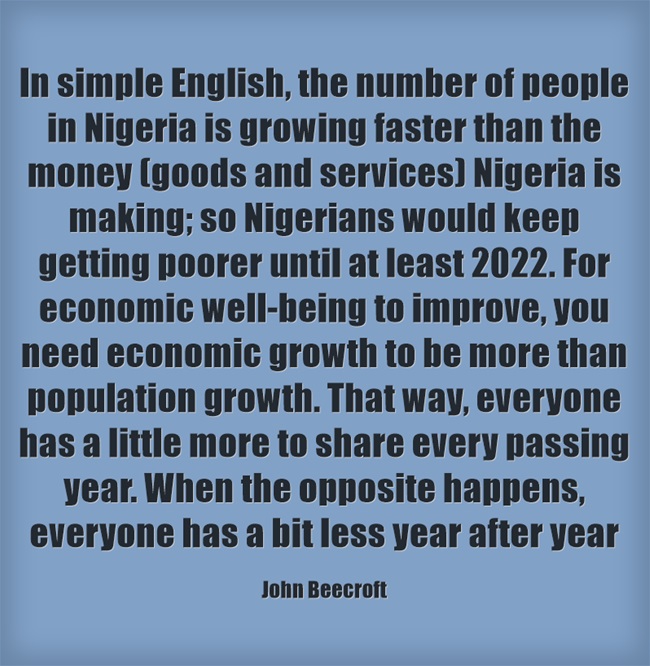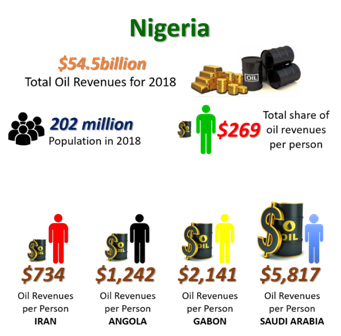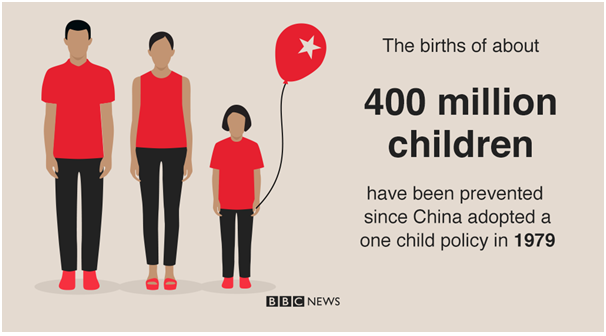
By John Beecroft
I have been a bit vocal about Nigeria’s overpopulation for a while now, and recently someone challenged me to proffer solutions. That got me thinking and I plan to share some of the ideas so you all can help clean it up, just in the hope that I might be in a position to do something about it someday. But just so we are on the same page, why do we need to do something about Nigeria’s population?
Population and the Nigerian Economy
Indices and events around Nigeria show that things are not going to be okay anytime soon. This was the subject of an article I wrote earlier in the year – 2019, Which Way Nigeria. I however expected the situation to gradually improve over the coming years, but PwC quickly perished that thought this morning through one of their reports – Bringing Dead Capital to Life.
Register for Tekedia Mini-MBA edition 19 (Feb 9 – May 2, 2026): big discounts for early bird.
Tekedia AI in Business Masterclass opens registrations.
Join Tekedia Capital Syndicate and co-invest in great global startups.
Register for Tekedia AI Lab: From Technical Design to Deployment (next edition begins Jan 24 2026).
“The IMF’s most recent report on Nigeria concluded that Nigeria is set to experience incremental decline to income per capita over the next 8 years, through 2022. This decline is a result of slow GDP growth exceeded by a population growth rate that is not expected to slow in the near future. Population is expected to reach 263 million by 2030. In contrast, GDP is growing at a slower and less consistent rate, averaging 1.4% since 2016.”
In simple English, the number of people in Nigeria is growing faster than the money (goods and services) Nigeria is making; so Nigerians would keep getting poorer until at least 2022. For economic well-being to improve, you need economic growth to be more than population growth. That way, everyone has a little more to share every passing year. When the opposite happens, everyone has a bit less year after year. It’s like you are a bachelor earning say N100,000 monthly and living life. Then let’s say 5 years later, your salary has doubled to N200,000. Are you actually better off? Possibly. But what if during that period, you get married, wifey becomes a career mum to two kids and your hungry brother comes to stay with you? Your per capita income goes from N100k monthly (N100,000 divided by 1 person) to N40k monthly (N200,000 divided by 5 people). In this case, your family population growth (500%) has far exceeded your economic growth (100%) and you’re almost in crisis. If you think it sounds like a terrible situation to be in, you are absolutely right!

With population growth rate of 2.6% almost double our GDP growth of 1.4% on average, Nigeria is in exactly the same situation now. We can eliminate corruption and stop paying our beloved hardworking legislators those fat salaries, but it still wouldn’t be enough.
A large population cane be a great blessing, IF:
- That population is highly educated
- That population is very productive
- The economy is expanding faster than the population
Sadly, Nigeria’s population is none of the above. We have then compounded those problems with corruption and runaway population growth.
Perhaps you don’t understand the import of the figures above? Let me draw it for you.

Using the United State of America (US), the holy grail with GDP per capita of about $56k, as our benchmark, the first chart shows what will happen to Nigeria over the next 60 years if we maintain our current direction (case 1) with GDP growth of 1.4% and population growth of 2.6% per annum. There can only be one outcome: Starvation, unrest… In case 2, assuming we continuously grow the economy at 7.5% annually, but keep giving birth like rabbits (at an average of 5.4 children per woman, Nigeria ranks among the top 10 in the world), by 2080 Trump would still be calling Nigeria a ‘shithole’ country. However, if while growing the economy steadily, we manage to slow down our population growth rate similar to the US (case 3), we will get to where the US is today sometime around 2070! As bad as that sounds, this is a best-case scenario for me.
Lots of people delude themselves that Nigeria’s oil proceeds are enough to solve our problems if corruption is eliminated. Sorry, it’s not nearly enough. Yes, we have massive oil reserves, but when compared to the size of our population, it’s too little. According to OPEC, Nigeria earned $54.5b as total revenue from oil in 2018. (Accurate net income figures are too hard to come by.) This was about the same with Iran ($60.2b), far more than Angola ($36.3b) and more than 10 times that of Gabon ($4.2b). However, when you compare the number of mouths the different countries have to feed like the example above, you find that the share available to Nigerians is practically insignificant. Now you understand why Nigeria is considered poor.
But I’m sure we all know the problem. Question is, what can be done about it?
Typically, there are two ways out of such a situation: You can either find a better paying job or business (minimum of N600k monthly to maintain the original lifestyle) or reduce your family population by chasing away your brother and sending the twins to your rich uncle. Let’s explore the options for our dear country.
Option 1 – Growing the Economy
I am not sure we can expand our oil production fast enough, and even if we do, we don’t have enough of it. However, we have massive amounts of gas so we have a chance with that. Only problem is that it requires terrible amounts of capital, so back to square one. Agriculture? We have lots of arable land, but it’s difficult to build a modern economy on the back of labour-intensive agriculture.
The tax drive is really commendable, with the tax paying population having doubled in the past few years, but more needs to be done. Manufacturing has to be drastically improved, importation curbed to manage the trade deficits and oil subsidies eliminated. The size of government needs to be reduced so that funds can be directed towards infrastructure.
But I’m reluctant to talk about this – growing the economy – in this article as my goal is elsewhere. I’ll let smarter people tell us how to go about it.

Option 2 – The Population Solution
China had a one-child policy, in which having more than one child was discouraged. They made this happen through a combination of permits, fines e.g. deductions of up to 10% of salaries of erring couples, and incentives. These incentives included health care subsidies, housing priority and extra retirement pay according to Matthew Connelly in Fatal Misconception: The Struggle to Control World Population. The child also had preference choosing schools and jobs. Sadly, there were also forced abortions and sterilisations as some provinces tried to meet their quotas. Considering that China prevented about 400 million new babies – two times the size of Nigeria – I say their effort was very successful!
India largely followed the Chinese model for a while, but with more extreme measures – more than 8 million men sterilised within a year. Iran made it mandatory for couples to attend contraceptive courses before giving them marriage licenses.
Interesting thing about the examples above are that they are largely homogeneous cultures, which makes it a bit easier to implement policies. Nigeria on the other hand would be a tough nut to crack; any measure must take into account the religious differences and tribes too numerous to count. Any hint of racial or religious targets would end in disaster. Yet, we need to slow down this runaway population, else we will consume our children’s future.
First of all, we all need to know that fertility rate which is sustainable, that birth rate that would give us just the right population growth we want. We must begin with a massive enlightenment drive especially at the grassroots and rural areas. Couples need to have an idea of the financial costs of adequately bringing up a child and must be made to understand why it is important to give birth to only that number they can properly take care of. While I won’t say they should be arrested, there needs to be an understanding that giving birth to six kids when you earn barely enough to send one to school is unfair to those kids and is a crime against the society that has to bear the ultimate cost!
In the rural areas, people must be consciously made to understand the damaging effects of having too many children including reduced opportunities through inheritance, lower quality of education due to scarce resources, high medical costs etc. The government, and non-governmental organisations, need to invest in passing across this message – through our Youth Corpers, at the marriage registries, on TV & radio, in churches & mosques, anywhere and everywhere.
Next, a national policy needs to be put in place supporting fewer children. This could encompass a number of ‘carrot and stick’ measures.
For instance, rather than free Universal Basic Education (UBE), the policy should only cover 2 or 3 kids per family. The same applies to free meals in schools. Government pays for the first 2 or 3 kids and the parents pay substantially for the remaining children.
For those who maintain the ‘sustainable’ family size, they can get incentives such as credits to spend on fertilizer and farm implements in the rural areas. In the towns and cities, these credits could be used for health insurance, public mass housing, government-sponsored pilgrimages and so on.
The credits can also be used for taxes. For example, if you remain within the sustainable family band, you get 1 or 2 points below the standard tax rate. So perhaps, while Mr X with 6 kids pays 22% of his income as tax, Mr Y with only 3 kids pays 20%.
I could go on and on, but I believe the message is already clear – a conscious effort needs to be made to link the negative consequences of unsustainable population growth directly to people’s pockets. Only then will they ‘hear word’.

In Summary
There is no single panacea to our problems; it must be a combination of measures. Yes, education and infrastructure would go a long way, but as shown in the charts above (case 2), it would still take too long. It is inevitable that growing the economy must be combined with a conscious effort to slow down our population growth.
But while growing the Nigerian economy is largely a Buhari problem, you and I on our own can largely influence the population solution. Have you dropped two or three kids? Then please call it quits, ‘e don do’ – for the sake of those children and the sake of Nigeria. My dream from a little boy had been to have four children of my own – two tough boys and two pretty girls. However, in playing my part towards our population dilemma, I have resolved to limit that number to two – if only I can get wifey to approve.




I totally agree with you. Our population is a real threat. The earlier we consciously address it the better.
Certainly – it needs to be fixed urgently in this nation.
The Japanese population decrease syndrome should also be noted.The
Chinese may eventually have the same problem since families seem to prefer
no more than one child even though the
old Malthusian restrictive laws have been relaxed. We can see the steady population growth in Nigeria as a positive
development but as you lucidly explain, only
If economic growth kept pace with and outstripped population growth. This is not an Impossible task but requires:
Structural change
Enlightened purposeful planning
Economic warriors and strategists
Diversification
Collaborative financial and investment activism
Prof, no one will stop population growth in Nigeria. It is a tool for tribal politics! A governor was bragging last week how population will ensure his formation can control national politics. Until the leaders see the implications, nothing will work.
I have a different perspective. While government remains the single largest influencer, until we the people stop blaming government for everything and start taking action in our little way, nothing will work.
John Beecroft, reading through this article has been a great pleasure. Your insights, research and reasoning around the issue of population has opened me up. There are huge business opportunities two around it and i sincerely appreciate you for this.
Hi Chiedozie, I’m really glad that you found it useful. Hopefully, it would also encourage you to spread the word. Taking control is your job and mine.
I have a different perspective. While government remains the single largest influencer, until we the people stop blaming government for everything and start taking action in our little way, nothing will work.
We have left things to our inept government for too long; it’s high time we try something different.